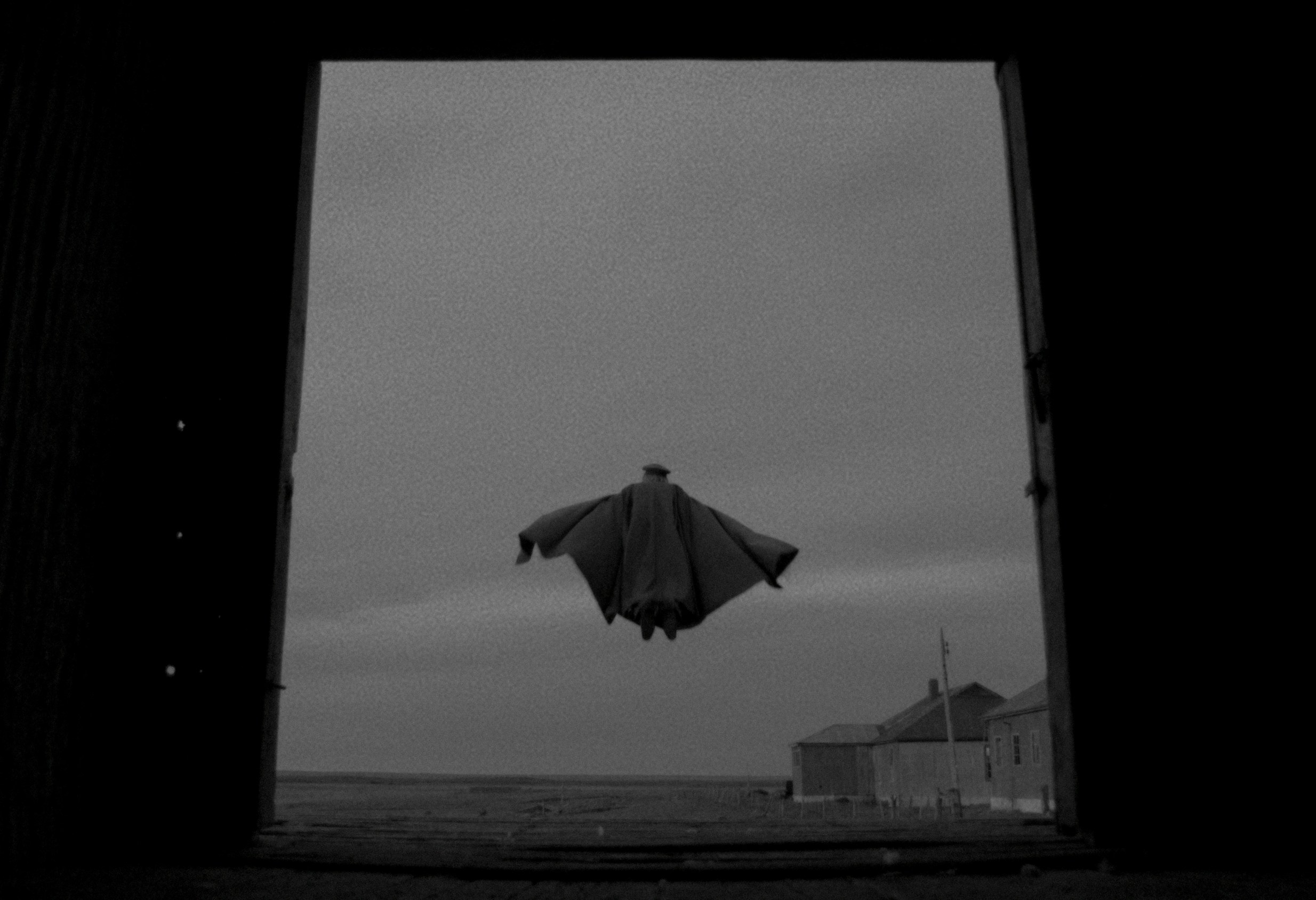On September 11, 1973, Chilean military commander Agosto Pinochet orchestrated a coup and seized power over President Salvador Allende. Nearly 50 years later, the undead vampire Pinochet has absconded to the countryside, having faked his death after the end of his regime.
It didn’t quite happen that way, but it’s the fantastic twist of director Pablo Larraín’s gothic satire “El Conde” (“The Count”), the filmmaker’s latest and most ambitious response to the lingering trauma of the Pinochet years. A black-and-white blend of atmospheric silent-era horror and dark humor, the movie confronts the impact of the Pinochet years by transforming the man into a literal bloodsucker who drained the life out of his country.
The Netflix production, which premieres in competition at the Venice Film Festival later this month, adds a provocative new angle to Chile’s relationship with its former ruler. The scope of that history is so vast that “El Conde” was originally envisioned as a miniseries before Netflix executives proposed the feature-length approach. “He’s an overwhelming figure who has such an impact in our society,” Larráin told IndieWire in a video interview this week from Europe, where he’s in pre-production on his next project. “He introduced elements of horror and tragedy and violence that kind of broke our country.”
The dictator, who actually died peacefully at the age of 91 in 2006, has been an ominous off-screen presence in Larraín’s work with the psychological thriller “Tony Manero” and “Post Mortem,” as well as 2012 Oscar nominee “No,” which documented the succesful campaign to remove him from office.
With “El Conde,” the filmmaker puts the figure at the center of his frame. “I was really trying to face him this time,” Larraín said. “I don’t think there’s another movie or TV show that has Pinochet as the main character. For a number of reasons, we have not been ready to do it, and I felt that this was a good opportunity to put a camera right on his face.”
Legendary Chilean actor Jaime Vadell plays Pinochet at a crossroads. Larraín’s script, co-written with regular collaborator Guillermo Calderón, imagines Pinochet as a creature born some 250 years ago who started his life fighting against the French Revolution. From there, he fought through a series of revolutions until landing in Chile, where his autocratic aspirations could be fully realized.

His story, narrated by a woman who remains a mystery until another history-busting twist late in the game, revolves around the vampire’s desire to end his life and sort out his inheritance with his backbiting adult children. (Think “Succession” meets “Nosferatu.”) Meanwhile, as his wife (Gloria Münchmeyer) engages in an affair with his butler (Alfredo Castro) and an undercover nun (Paula Luchsinger) disguises herself as an accountant in attempt to take him down, Pinochet contemplates his lingering presence in Chilean society.
The circumstances are at once absurd and unsettling in their metaphorical implications. “Pinochet was a man who never faced a trial for what he did,” Larraín said. “That impugnity made him eternal. That is what happened to us.” He added that Pinochet’s impact stood in contrast to last year’s Oscar-nominated “Argentina 1985,” an uplifting crowdpleaser about the Trial of the Juntas that followed the end of that country’s dictatorship. “That movie is about justice and seeking some sort of agreement that something like that can never happen again,” Larraín said. “Pinochet died a millionaire, absolutely free. That lack of justice is why my country is split, divided. It’s a very painful thing, but it’s the truth.”
Pinochet was ultimately ostracized by supporters over a money-laundering trial, though his lawyers claimed he had dementia and he evaded justice again. In Larraín’s take, the vampire Pinochet remains stung by the accustations, even though they’re true. “He’s a defeated man because he was called a thief,” Larraín said. “That’s something in the heart of this movie — a soldier can be called a killer because that’s what they’re trained to do, but never a thief. When Pinochet was accused of stealing money, most of the people who had protected him over the years didn’t know what to say anymore, especially the extreme far right. That broke the sympathy of a lot of people. It’s the first joke of this film.”
Over the past decade, Larraín has forged a career in reexamining recent public figures, from Jacqueline Kennedy Onassis in “Jackie” to Princess Diana in “Spencer,” but “El Conde” brings him back to sensitive terrain in more ways than one. Larraín and his producer brother Juan de Dios come from a long line of influential Chilean politicians and high-society influencers. Their mother, Magdalena Matte, served in the rightwing government of former president Sebastián Piñera, while their father Hernán Larraín was a conservative senator for decades whose party was closely associated with the Pinochet era. Larraín has gotten used to shrugging off those contrasts.

“I understand that there may be things linked to my family and life that could affect the way I see all this,” he said. “In Chile, many, many families have seen both sides of the story and different perceptions of it. Maybe mine is more known because there are known politicians in it, and I’m a known filmmaker in that cocktail. But I honestly don’t think this is an act of rage or indiscipline against my family. I’m not trying to be the weird rebel or the black sheep. I don’t do these films because of that. I do them because they’re necessary.”
Regardless of its political inclinations, “El Conde” stands out as the sole black-and-white work in Larraín’s oeuvre. Just as the analog video of “No” evoked the late ’80s, the grainy, expressionistic visuals of “El Conde” root the movie in the vernacular of cinematic horror, from “Nosferatu” to “Vampyr.” The filmmaker turned to veteran cinematographer Ed Lachman (“Carol”), who took an innovative approach to the visual concept. “We wanted a grainy look and he brought this old-time sort of classic style where the light has no specific direction,” Larraín said. “You can’t tell where it’s coming from. That allows for a very immersive visuality. You don’t really understand how the image is created. It’s the kind of magic only a master could create.”
Lachman went so far as to have ARRI provide a monochrome ALEXA camera for the production that doesn’t exist on the market. “We captured the picture directly in black and white,” Larraín said. “It was very unusual.” That choice meant that many of the colors used on set were chosen for the gray scale — and some of the brighter choices stood in jarring contrast to the end result. “We had people dressing in light yellow or deep greens,” Larraín said. “The blood of the film is blue because you can see it better than red. Sometimes it was really funny.”
Humor pervades many aspects of the plot, though Larraín said he was aiming for the vibe of “Dr. Strangelove,” in that the undercurrent of real-world threats wasn’t negated by comical juxtapositions. Pinochet’s familial conundrums may humanize him, but of course, in “El Conde,” he isn’t human to begin with. “Look, empathy is conductive to narrative,” Larraín said. “But you’re dealing with a monster who’s extremely unlikable. If for a brief second you can laugh at a tragedy, maybe that can be an act of healing.”

“El Conde” arrives at Venice this month at a unique moment in the aftermath of the dictatorship, and not only because it coincides with the 50-year anniversary of Pinochet’s military coup. Through their production company Fabula, the Larraíns also produced “The Eternal Memory,” a Sundance hit that opens in the U.S. from MTV Documentary Films this week. The movie finds “The Mole Agent” director Maite Alberdi following prominent journalist Augusto Góngora, who played a key role in chronicling the Pinochet years before losing his mind to Alzheimer’s disease.
An awards-friendly tearjerker, “The Eternal Memory” could make inroads with the Best Documentary category just as 2021 nominee “The Mole Agent” did before it. If Chile selects “El Conde” as its Oscar submission when the national deadline arrives at the end of this month, the Larraíns could have contenders for Best Documentary and Best International Feature Film in the same year — both of which cast the specter of the Pinochet years in a new light.
“Maite’s movie is extraordinary — a touching, beautiful, and sensitive film,” Larraín said. “Augusto Góngora is forgetting fragments of his life and he was one of the men who protected the memory of our country. This is related to ‘El Conde’ in the fact that without memory there is nothing you can turn to. Memory can be a door to compassion. If you avoid it, reality becomes darker.”
However the situation with those movies plays out, Larraín is once again taking a break from the Pinochet arena for his next project, a biopic of singer Maria Callas set to star Angelina Jolie. Regardless of how that may take place in the midst of the current WGA and SAG strikes, Larraín isn’t ready to discuss it. “It’s a very bad idea to talk about movies that aren’t made yet,” he said.
Watch the first trailer, exclusive to IndieWire, for “El Conde” below.






